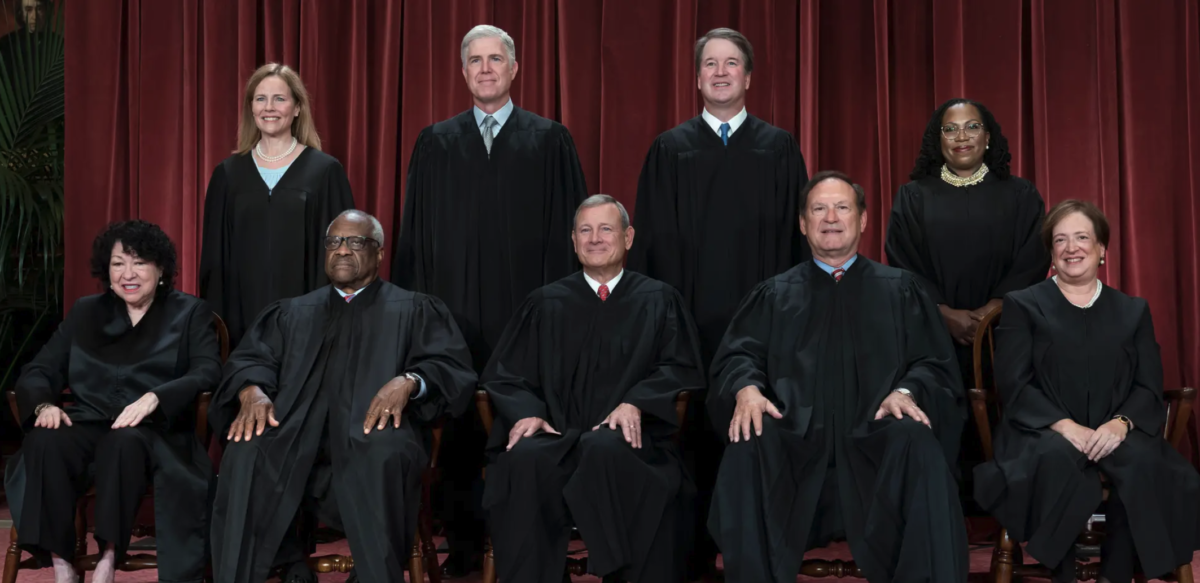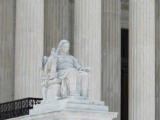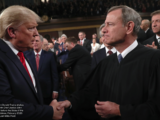By Glynn Wilson –
WASHINGTON, D.C. — It is great to find out on Thursday, June 29, 2023 — thanks to a conservative majority on the Supreme Court — that on the eve of American Independence Day, the United States has finally reached the zenith of its founding, self-evident pledge, “that all (people) are created equal … endowed … with certain unalienable Rights … among these … Life, Liberty and the pursuit of Happiness.”
Henceforth we will march forward as a nation with a “colorblind view,” according to the majority.
This would be great news, if only it were true.
Sadly, it is not.
This abomination of a court essentially ruled that the Equal Protection Clause of the Fourteenth Amendment — specifically written to provide equal protection under the laws to former slaves freed by the Thirteenth Amendment — is no longer a valid concern and must apply to conservative white guys as well from now on.
The great irony must be lost on some members of the court that the same Amendment to the Constitution — passed by the Senate on June 8, 1866, and ratified two years later, on July 9, 1868 — banned those who “engaged in insurrection” against the United States from holding any civil, military, or elected office without the approval of two-thirds of the House and Senate. The amendment prohibited former Confederate states from repaying war debts and compensating former slave owners for the emancipation of their enslaved people. It granted Congress the power to enforce this amendment, a provision that led to the passage of other landmark legislation in the 20th century, including the Civil Rights Act of 1964 and the Voting Rights Act of 1965. Congress required former Confederate states to ratify the Fourteenth Amendment as a condition of regaining federal representation.
This abominable decision fulfills a promise made by Justice Sandra Day O’Connor in 2003 — just three years after she admittedly cast the deciding vote to implant Republican George W. Bush in the White House even though he lost the popular vote and arguably the electoral vote — that “25 years from now … use of racial preferences will no longer be necessary.”
Well, that was supposed to happen in 2028. Sometimes, Justice comes a little early.
In a vote of 6-3, with the court’s liberal members dissenting, the Supreme Court ruled on Thursday that Affirmative Action admissions programs at Harvard and the University of North Carolina would henceforth be considered unconstitutional, making even a consideration of race in admissions or hiring illegal, according to the law of the land as decided by the Supreme Court.
Nevermind that for decades, the court deferred this decision to the administrators at the universities themselves, saying they were more qualified to decide best how to diversify their student bodies. Everyone has long agreed that diversity is good, even in terms of evolution.
According to early New York Times coverage of this breaking news, the decision is expected to set off “a scramble” as schools revisit their admissions practices. And “it could complicate diversity efforts elsewhere, narrowing the pipeline of highly credentialed minority candidates and making it harder for employers to consider race in hiring.”
“More broadly, the decision was the latest illustration that the court’s conservative majority continues to move at a brisk pace to upend decades of jurisprudence and redefine aspects of American life on contentious issues like abortion, guns and now race — all in the space of a year.”
The court had repeatedly upheld similar admissions programs, most recently in 2016, saying that race could be used as one factor among many in evaluating applicants.
The two cases before the court this time were not identical. As a public university, U.N.C. is bound by both the Constitution’s equal protection clause and Title VI of the Civil Rights Act of 1964, which bars race discrimination by institutions that receive federal money. Harvard, a private institution, is subject only to the legal statute.
In the North Carolina case, the plaintiffs said that the university discriminated against white and Asian applicants by giving preference to Black, Hispanic and Native American ones. The university responded that its admissions policies fostered educational diversity and were lawful under longstanding Supreme Court precedents.
The case against Harvard has an additional element, accusing the university of discriminating against Asian American students by using a subjective standard to gauge traits like likability, courage and kindness, and by effectively creating a ceiling for them in admissions.
Lawyers for Harvard said the challengers had relied on a flawed statistical analysis and denied that the university discriminated against Asian American applicants. More generally, they said race-conscious admissions policies are lawful.
Both cases — Students for Fair Admissions v. Harvard, No. 20-1199, and Students for Fair Admissions v. University of North Carolina, No. 21-707 — were brought by Students for Fair Admissions, a group founded by Edward Blum, a white, conservative legal activist who has organized many lawsuits challenging race-conscious admissions policies and voting rights laws, several of which have reached the Supreme Court.
The universities both won in federal trial courts, and the decision in Harvard’s favor was affirmed by a federal appeals court.
In 2016, the Supreme Court upheld an admissions program at the University of Texas at Austin, holding that officials there could continue to consider race as a factor in ensuring a diverse student body. The vote was 4 to 3. (Justice Antonin Scalia had died a few months before, and Justice Elena Kagan was recused.)
Writing for the majority, Justice Anthony M. Kennedy said that courts must give universities substantial but not total leeway in devising their admissions programs. He was joined by Justices Ruth Bader Ginsburg, Stephen G. Breyer and Sonia Sotomayor.
Seven years later, only one member of the majority in the Texas case, Justice Sotomayor, remains on the court. Justice Kennedy retired in 2018 and was replaced by Justice Brett M. Kavanaugh; Justice Ginsburg died in 2020 and was replaced by Justice Amy Coney Barrett; and Justice Breyer retired last year and was replaced by Justice Ketanji Brown Jackson.
Justice Jackson recused herself from the Harvard case, having served on one of its governing boards.
The majority decision in this case was written by Chief Justice John Roberts, appointed to the court by George W. Bush. He was joined by Sam Alito, also a Bush appointee, along with Neil Gorsuch, Brett Kavanaugh and Amy Coney Barrett, all Trump appointees. And of course they were joined by Clarence Thomas, appointed by George H.W. Bush.
Key Paragraph
“Because Harvard’s and UNC’s admissions programs lack sufficiently focused and measurable objectives warranting the use of race, unavoidably employ race in a negative manner, involve racial stereotyping, and lack meaningful end points, those admissions programs cannot be reconciled with the guarantees of the Equal Protection Clause. At the same time, nothing prohibits universities from considering an applicant’s discussion of how race affected the applicant’s life, so long as that discussion is concretely tied to a quality of character or unique ability that the particular applicant can contribute to the university. Many universities have for too long wrongly concluded that the touchstone of an individual’s identity is not challenges bested, skills built, or lessons learned, but the color of their skin. This Nation’s constitutional history does not tolerate that choice.”
Dissent
Leading in writing the dissent was Sonia Sotomayor, appointed to the court by President Barack Obama in 2009. She was joined by Elena Kagan, also an Obama appointee. Ketanji Brown Jackson, President Joe Biden’s only appointee on the court, joined the dissent in the North Carolina case, but recused herself in the Harvard case since she previously served on one of the college’s governing boards.
Key Paragraphs
“The Equal Protection Clause of the Fourteenth Amendment enshrines a guarantee of racial equality. The Court long ago concluded that this guarantee can be enforced through race-conscious means in a society that is not, and has never been, colorblind. In Brown v. Board of Education, 347 U. S. 483 (1954), the Court recognized the constitutional necessity of racially integrated schools in light of the harm inflicted by egregation and the “importance of education to our democratic society.” Id., at 492–495. For 45 years, the Court extended Brown’s transformative legacy to the context of higher education, allowing colleges and universities to consider race in a limited way and for the limited purpose of promoting the important benefits of racial diversity. This limited use of race has helped equalize educational opportunities for all students of every race and background and has improved racial diversity on college campuses. Although progress has been slow and imperfect, race-conscious college admissions policies have advanced the Constitution’s guarantee of equality and have promoted Brown’s vision of a Nation with more inclusive schools.
“Today, this Court stands in the way and rolls back decades of precedent and momentous progress. It holds that race can no longer be used in a limited way in college admissions to achieve such critical benefits. In so holding, the Court cements a superficial rule of colorblindness as a constitutional principle in an endemically segregated society where race has always mattered and continues to matter. The Court subverts the constitutional guarantee of equal protection by further entrenching racial inequality in education, the very foundation of our democratic government and pluralistic society. Because the Court’s opinion is not grounded in law or fact and contravenes the vision of equality embodied in the Fourteenth Amendment, I dissent.”
Early Reaction
“Today’s Supreme Court ruling on affirmative action undermines five decades of precedent and our nation’s continued march toward progress — obstructing students of color from exercising their right to equal opportunity in higher education,” said Democratic Whip Katherine Clark of Massachusetts in a statement reacting to the decision.
“The Court’s extreme conservative majority has applied a color-blind standard when we know we don’t live in a color-blind society. As Justice Sotomayor put it, this ruling only further entrenches racial inequality in education — ‘the very foundation of our democratic government and pluralistic society’.” she said. “As we learn more about what this means for the future of college admissions, House Democrats remain committed to upholding and honoring diversity and inclusion in all of our nation’s institutions — from college campuses and the ranks of our Armed Forces, to Capitol Hill and corporate boardrooms. We must ensure everyone has the opportunity to fully participate in our democracy.”
Also in response to the decision, House Judiciary Committee Ranking Member Jerrold Nadler and Constitution Subcommittee Ranking Member Mary Gay Scanlon released a statement:
“Today’s Supreme Court decision sharply curtailing the ability of colleges and universities to consider race as part of their student admissions decisions represents the conservative supermajority’s latest, shameful abandonment of decades of precedent to overturn a policy that millions of Americans have come to rely on and that was a hallmark of America’s commitment to ensuring diversity, equity, and inclusion for all of its people,” they say.
“All Americans benefit from colleges and universities with student bodies that reflect the racial and ethnic diversity of our nation, giving students the opportunity to learn different viewpoints shaped by diverse life experiences and producing citizens who will be better equipped to participate in and lead our evermore diverse society in the future. We are deeply disappointed in this decision and commit to continuing the fight to ensure a fairer, more inclusive, and more equitable society.”
For decades, the Supreme Court recognized a college’s freedom to decide how to build a diverse student body and provide opportunity.
Today, the Court walked away from precedent, effectively ending affirmative action in higher education.
I strongly disagree with this decision.
— President Biden (@POTUS) June 29, 2023
Affirmative action was never a complete answer in the drive towards a more just society. But for generations of students who had been systematically excluded from most of America’s key institutions—it gave us the chance to show we more than deserved a seat at the table.
In the… https://t.co/Kr0ODATEq3
— Barack Obama (@BarackObama) June 29, 2023
___
If you support truth in reporting with no paywall, and fearless writing with no popup ads or sponsored content, consider making a contribution today with GoFundMe or Patreon or PayPal. We just tell it like it is, no sensational clickbait or pretentious BS.














